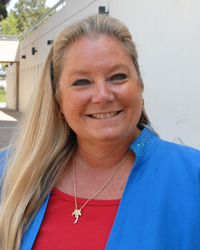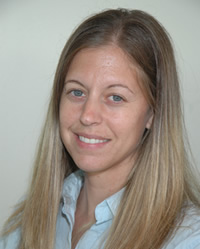Autism Research Explored
Evidence-Based Practices on Agenda for April 24-25 Conference
What:
Cal State Fullerton’s “Autism Inclusion and Evidence-Based Practice” conference features nationally known researchers and educators. The purpose of the event is to disseminate evidence-based best practices for individuals with autism, said Belinda Dunnick Karge, professor of special education and conference chair.
Who:
Speakers and panelists are among the top researchers and experts in the field of autism, Dunnick Karge said. More than 400 people are expected to attend the sold-out conference, including teachers, students, parents and other professionals. The conference also features workshops, vendor exhibits and community resources.
When:
Friday, April 24, 8:30 a.m. to 5 p.m.
Saturday, April 25, 8:30 a.m. to 5 p.m.
Where:
Embassy Suites
900 S. Birch St., Brea

Dunnick Karge
Background:
Studies show that autism afflicts one in 150 children in the United States and is four times more likely to occur in boys, noted Dunnick Karge. The conference chair facilitates special education teaching grants, has published numerous books and journal articles and is a leader in the field of collaboration with general and special education.
“Although there are many ways to get information on autism, I believe this conference is favored over other venues as we present only evidence-based practices, and our focus is on supporting students with autism in general education settings,” Dunnick Karge said. “It appears our audience will be 60 percent teachers, 20 percent parents and 20 percent other professionals, including nurses, doctors, lawyers, psychologists and speech and language pathologists.”
Schedule of speakers:
8:30 a.m. Friday, April 24: Rob Horner, a professor of special education at the University of Oregon, where he directs the Educational and Community Supports research unit, will present “Using Response to Intervention to Achieve Quality Education for All Learners.” Response to intervention is an approach to educational improvement that has the potential to assist schools in focusing on both academic and behavioral goals. According to Horner, children with autism can be successful in schools where schoolwide positive behavior support is implemented.

Suzanne Robinson
10:30 a.m. Friday, April 24: Suzanne Robinson, assistant professor of special education at Cal State Fullerton, will discuss “Promoting Socially Meaningful Education Programs for Students with Autism: Issues and Practices.” Robinson’s research involves the dissemination of evidence-based practices for students with autism, parent and teacher training, inclusion and positive behavior support. Her presentation will review current issues related to social instruction and the research that addresses the socials needs of students with autism within the school system; discuss critical components of a socially beneficial and meaningful education program and the research-to-practice gap; and outline practical, evidence-based strategies for promoting social interaction and relationships with typical peers in the natural, inclusive environment.
8:30 a.m. Saturday, April 25: “Supporting Peer Relationships at School for Children with Autism” is the topic of the presentation by Connie Kasari, professor of psychological studies in education and psychiatry at UCLA Graduate School of Education and Information Studies. Involved in research for 25 years, she is the principal researcher for the Autism Intervention Research Network for Behavioral Health. Kasari is a founding member of the Center for Autism Research and Treatment at UCLA. Her presentation will focus on the results of research that has examined children with autism spectrum disorders and their understanding of their own relationships with peers, as well as their feelings of both friendship and involvement at school.
10:30 a.m. Saturday, April 25: Kent Gerlach, a professor in the Department of Instructional Development and Leadership at Pacific Lutheran University in Tacoma, Wash., will discuss “Supporting Students With Autism Spectrum Disorders: Ethical Guidelines Concerning the Role of Paraprofessionals.” The number of paraprofessionals supporting the learning and behavioral needs of students in various educational settings has steadily and dramatically increased over the years. The session will discuss research efforts on the role of one-to-one assistants, stressing the critical importance of teamwork and supervision.
3:45 p.m. Saturday, April 25: The closing session features a panel discussion about the Riverside County Office of Education’s Reach Autism Program. Started in 2004 with six students, the program now serves more than 200 students across 16 school districts. The program’s development and success will be described through the perspective of a person with autism, a teacher and an administrator.
Workshops:
Sessions both days will include a variety of topics focusing on behavioral problems, challenges and approaches, as well as behavioral intervention programs; inclusion as an educational model; creating a positive team to support students with autism; using assistive technology; and free resources and parent information to help them take ownership of their child’s program at home and at school.
Other:
The conference is funded, in part, through grant monies awarded to Cal State Fullerton from the U.S. Department of Health and Human Services, Centers for Disease Control and Prevention. The university received a $35,000 CDC grant for this year's conference. The conference committee includes university faculty, local educators and community members.
Media Contacts:
Belinda Dunnick Karge, Special Education, 657-278-3760 or bkarge@fullerton.edu
Debra Cano Ramos, Public Affairs, 657-278-4027, 657-278-2414 or dcanoramos@fullerton.edu
